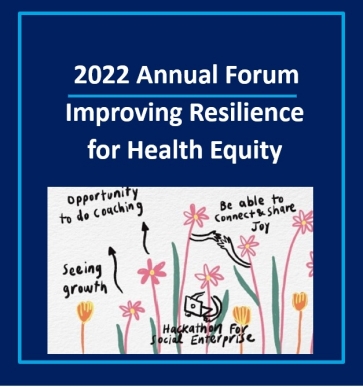2022 Annual Forum: Improving Resilience for Health Equity

The Equity Initiative’s 2022 Annual Forum, held virtually January 21-23, was a great success. With participation of Fellows from five cohorts and the thought-provoking presentations of invited speakers, the meeting reaffirmed the importance of our Fellows’ health equity work. The Annual Forum’s theme of "Improving Reslience for Health Equity" was the thread that connected presentations on the purpose and power of philanthropy, responding to health emergencies and humanitarian crises, and examples of health equity in action.
CMB President Barbara Stoll opened the program, noting the disappointment that participants shared when the omicron surge caused the program format to shift from an in-person to virtual gathering. Highlighting the forum’s theme, she said that resilience has never been more important, given the ongoing impact of the COVID-19 pandemic and the political upheavals and natural disasters in many parts of the world. Those challenges magnify the importance of the Equity Initiative and the program’s long-term goal of empowering the next generation of leaders and building communities to promote health equity and social justice. She offered Fellows the inspiring words of the poet Amanda Gorman, closing her remarks with these words: “For there is always light, if only we’re brave enough to see it. If only we’re brave enough to be it.”
Chris Oechsli, President and CEO of The Atlantic Philanthropies and a member of the Equity Initiative’s Southeast Asia Program Advisory Committee, shared his own thoughts on resilience in his keynote remarks. The fundamentals of resilience, he said, include both clarity of purpose and the importance of joy, which he defined as a deep sense of well-being and satisfaction. He highlighted some of the distinctive characteristics of Chuck Feeney, the founder of The Atlantic Philanthropies, to illustrate several key tenets of leadership: empathy; a hunger for information; seeking advice from others, especially those working on the ground; a willingness to empower others; and being forgiving when people made mistakes. Chris encouraged Fellows to approach their work a spirit of curiosity, to see mistakes as an opportunity for learning, to trust in themselves, and, as importantly, to pay attention to their personal well-being.
Joanne Liu, a professor at McGill University in Canada, spent more than 20 years working with Médecins San Frontières/Doctors Without Borders. Dr. Liu’s experiences in providing health care in crisis situations gave Fellows a deeply moving example of resilience in the face of tragedy. She described some of her toughest assignments: working on the frontlines of Sri Lanka’s civil war; coordinating an international response following the air strike on MSF’s hospital in Kunduz, Afghanistan – a dark day for MSF and for all humanity; responding to the Ebola crisis in Africa; and more recently, working with refugees in Cox’s Bazar, Bangladesh. Dr. Liu advises young professionals to do something that will make a difference in people’s lives; spend time at “ground zero” seeing problems where they exist; and be willing to speak uncomfortable truths with strength and conviction.
A panel discussion on building resilience and health equity in Myanmar was both poignant and inspiring. The discussion focused on a confluence of crises – political, health, financial, educational – which have resulted in social disruptions, displaced persons, loss of life, and personal traumas. The panelists said it has been humbling to witness the determination and resilience of the people of Myanmar in the face of these conditions. Community and leadership take on even greater importance during these times, and leaders, recognizing their own vulnerability, should exercise self-care in order to be better able to help others.
Interspersed throughout the course of the program were an opening video that reminded participants of the power of experiential learning and the joy of meeting in person; Fellows’ reports on projects undertaken with the support of Community Building Funds; an opportunity for Fellows to share highlights of their own equity actions during the “Ideation Caravan”; and a “Dream Tech” exercise, which served as an incubator for new ideas and future collaborations.
Fellows and EI staff expressed anticipation for meeting in person, when conditions permit, and for continuing to offer each other support in promoting health equity in the region.
For a visual summary of the Annual Forum, please click here.
